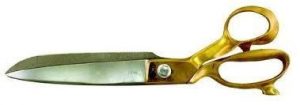 The vibrant city of Meerut, with its rich history and culture, is renowned for an unexpected product—scissors. These unique, high-quality scissors have been crafted in Meerut since the 17th century, with their origin dating back to 1645. According to local legends, a blacksmith named Akhunji first combined two swords to cut leather, marking the creation of the first pair of scissors in India during the Mughal period. Today, Meerut’s scissors continue to be a source of pride for the city, and in 2013, they were awarded a Geographical Indication (GI) tag, recognizing their distinctiveness and craftsmanship.
The vibrant city of Meerut, with its rich history and culture, is renowned for an unexpected product—scissors. These unique, high-quality scissors have been crafted in Meerut since the 17th century, with their origin dating back to 1645. According to local legends, a blacksmith named Akhunji first combined two swords to cut leather, marking the creation of the first pair of scissors in India during the Mughal period. Today, Meerut’s scissors continue to be a source of pride for the city, and in 2013, they were awarded a Geographical Indication (GI) tag, recognizing their distinctiveness and craftsmanship.
The scissor-making industry in Meerut thrives as a cottage industry, where artisans pass down their knowledge from generation to generation. This centuries-old tradition has evolved over time, but the essence remains the same—handcrafted precision. The scissors of Meerut are classified into different types based on their functionality, the composition of the material used, and the size and weight of each pair.
Meerut’s scissor industry caters to a wide range of needs, producing scissors for various specialized uses. Some of the most common types include tailor scissors designed for cutting fabric with precision, barber scissors used in salons for hairstyling, utilitarian scissors for general household use, and others specifically designed for cutting leather, trimming plants, or even working in the sports industry. Specialized scissors are made for different industries, including the footwear and sports goods industries, where they are used for crafting gloves, leather cricket balls, and more. These scissors are also designed for copper wire cutting, glass and carpet cutting, and even precise tasks like trimming leaves or cutting threads.
The craftsmanship behind Meerut scissors involves a detailed, labor-intensive process. Every pair of scissors consists of two primary components—the blade and the handle. While the blades are largely made of steel, the type of steel used determines the kind of scissors produced. Carbon steel is used in scissors where the blade and handle form one continuous piece, known for their strength and sharpness. To prevent rusting, these scissors are often plated with nickel or chromium. On the other hand, stainless steel is used for lighter scissors, where the blade is attached to a plastic handle, making them rustproof and lightweight, suitable for everyday use.
In Meerut’s Kainchi Bazaar, the hub of the scissor industry, close to 600 units employ approximately 70,000 craftsmen. Each pair of scissors passes through around 22 pairs of hands, with each artisan an expert in a specific part of the process such as cutting, sharpening, welding, or polishing. This careful, meticulous work is what gives Meerut’s scissors their unique qualities, like strength, sharpness, sturdiness, smoothness, and durability, making them the preferred tool for tailors, barbers, and craftsmen across India.
One of the most remarkable features of Meerut scissors is their reusability. Unlike most other scissors, which may wear out or break over time, Meerut scissors can be repaired and reused multiple times. A popular local saying, “Dada le, potaa barte” (bought by the grandfather, used by the grandson), stands as a testament to the scissors’ long-lasting durability. The blades of these scissors are often crafted from scrap metal, salvaged from sources such as railway rolling stock or automobile junk from old buses, cars, and trucks. This innovative use of recycled materials not only adds strength to the product but also contributes to a more sustainable manufacturing process.
Despite its centuries-old tradition, the Meerut scissor industry continues to flourish in the modern era. The manual labor involved, combined with an attention to detail, has kept these scissors in high demand both in India and abroad. Their strength, sharpness, and durability make them a favorite tool for various professionals, from tailors to gardeners. With the GI tag, Meerut scissors have gained further recognition, helping to protect the identity of the product and support the livelihoods of thousands of artisans.
Meerut’s GI-tagged scissors are not just everyday cutting tools; they are a symbol of a rich cultural heritage, precision craftsmanship, and the enduring legacy of the artisans who have perfected this craft over generations.






